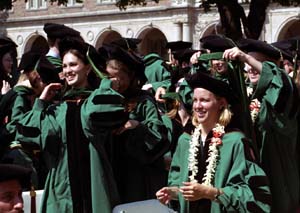The day that many students — undergraduate, graduate and professional — thought would never arrive is finally here.

The University’s 144th Commencement will mark a significant milestone in the lives of more than 2,500 students.
Chancellor Mark S. Wrighton will confer degrees during the ceremony, which will start at 8:30 a.m. in Brookings Quadrangle. Of the 2,511 candidates, 1,321 are undergraduate and 1,190 are graduate and professional.
There are 429 doctoral candidates, including 76 for the doctor of philosophy degree from the Graduate School of Arts & Sciences; 14 for the doctor of science degree from the Henry Edwin Sever Graduate School of Engineering & Applied Science; 230 for the juris doctoris degree from the School of Law; and 109 for degrees from the School of Medicine.
In the event of rain, Commencement will still take place in the Quad. If the weather turns violent, the ceremony for undergraduates will be moved to the Athletic Complex, while graduate and professional degrees will be bestowed at each respective school’s Commencement reception.
Streaming video of the ceremony will be broadcast online at commencement.wustl.edu. The webcast can be viewed in January Hall, Room 110; Brown Hall, Room 100; and Brown Hall, Room 118. All are wheelchair-accessible.

Richard A. Gephardt, former U.S. House minority leader, will give the Commencement address.
Gephardt stepped down in 2004 after serving nearly three decades as U.S. representative for Missouri’s 3rd District. A two-time presidential candidate, Gephardt also served as majority leader for Democrats in the House.
In August 1999, Gephardt and U.S. Sen. Christopher “Kit” Bond, R-Mo., received the Science Coalition’s Langer Award in recognition of their advocacy for federal government support of basic research. The coalition comprises some 400 organizations, institutions and individuals that support research funding.
In February, the University announced the establishment of the Richard A. Gephardt Institute for Public Service in his honor. The goal of the institute is to encourage people, especially students and older citizens, to become involved in public service.
Honorary degrees also will be awarded at Commencement. In addition to Gephardt, who will receive a doctor of humane letters, honorary degree recipients are:
• William H. Gass, Ph.D., the David May Distinguished University Professor Emeritus in the Humanities in Arts & Sciences at Washington University, doctor of humanities;
• Emily Rauh Pulitzer, founder and chair of the Pulitzer Foundation for the Arts in St. Louis, doctor of humanities;
• Robert G. Roeder, Ph.D., the Arnold O. and Mabel S. Beckman Professor of Biochemistry and head of the Laboratory of Biochemistry and Molecular Biology at Rockefeller University in New York, doctor of science; and
• James E. Stowers Jr., co-chairman of the Stowers Institute for Medical Research in Kansas City and founder and board member of leading investment manager American Century Cos. Inc., doctor of science.

Commencement will begin with the traditional academic procession into the Quad, which will be led by honorary grand marshal Lee Robins, Ph.D., professor emeritus of sociology in psychiatry in the School of Medicine and the founder of the Master in Psychiatric Epidemiology (MPE) Program.
Robins joined the medical school faculty in 1954 as a research assistant in psychiatry, rising to full professor in 1968.
Established in 1989, the MPE is the only program of its kind in the world, offering fundamental epidemiological and research skills to pre-doctoral students and postdoctoral fellows.
On the Hilltop Campus, Robins served as a lecturer and an adjunct associate professor of sociology from 1957-1969 and professor of sociology from 1969-1991, when she was named University Professor of Social Sciences. She served as a professor in the Program in Social Thought & Analysis in Arts & Sciences from 1991 until her retirement in 2001.
|
Violent Weather Plan The decision for implementing the Violent Weather Plan will be made by 7 a.m. today. Major local radio and TV stations will be given the information, and it will appear on wustl.edu and be announced through campus e-mail. |
Her studies have made key observations about how psychiatric disorders early in life can affect adults, revealing that antisocial behavior in childhood is a major predictor of psychiatric problems later in life. Those studies have forced her colleagues in psychiatry to rethink topics from teen suicide to drug abuse.
Robins’ first major study eventually became the book Deviant Children Grown Up, published in 1966. She also is the editor of 11 books.
Over the years, continuously supported by the National Institutes of Health, Robins gathered data on Vietnam veterans, disaster survivors and others. She also wrote the diagnostic interview schedule and was one of the principal investigators for the landmark Epidemiologic Catchment Area study in the 1980s.
The study involved more than 20,000 Americans who were interviewed to determine the prevalence of psychiatric illness in the general population.
Also at Commencement, approximately 125 alumni from the Class of 1955, celebrating their 50th reunion, will march in the opening procession.
For the 25th consecutive Commencement, the program will begin with music by The Mighty Mississippi Concert Band of St. Louis, under the direction of Dan Presgrave, music director/conductor of the University Symphony Orchestra, the University Wind Ensemble and The Saint Louis Wind Symphony.
Debra Hillabrand, who will receive a master of music in vocal performance degree, will sing “America the Beautiful.”
Jordan Friedman, president of the senior class, will deliver the student Commencement greeting (view article).
Conferral of academic degrees will follow, with the deans of each of the schools and Edward S. Macias, Ph.D., executive vice chancellor, dean of Arts & Sciences and the Barbara and David Thomas Distinguished Professor in Arts & Sciences, assisting Wrighton.
After the conferral of degrees, Wrighton will deliver his message to the Class of 2005.
Clark Sturdevant, who will receive a master of music in vocal performance degree, will conclude the ceremony by singing the “Alma Mater.”
Afterward, the University’s schools will hold receptions for graduates and their guests.